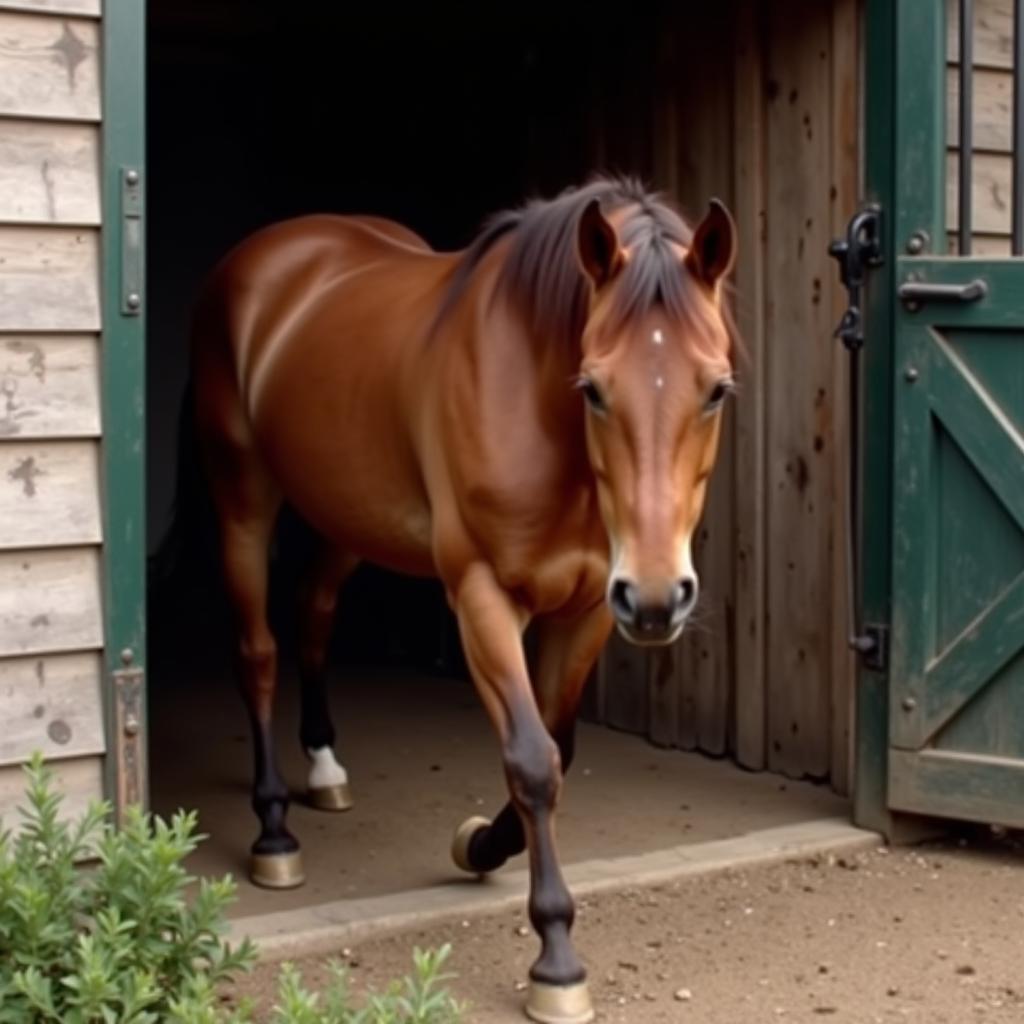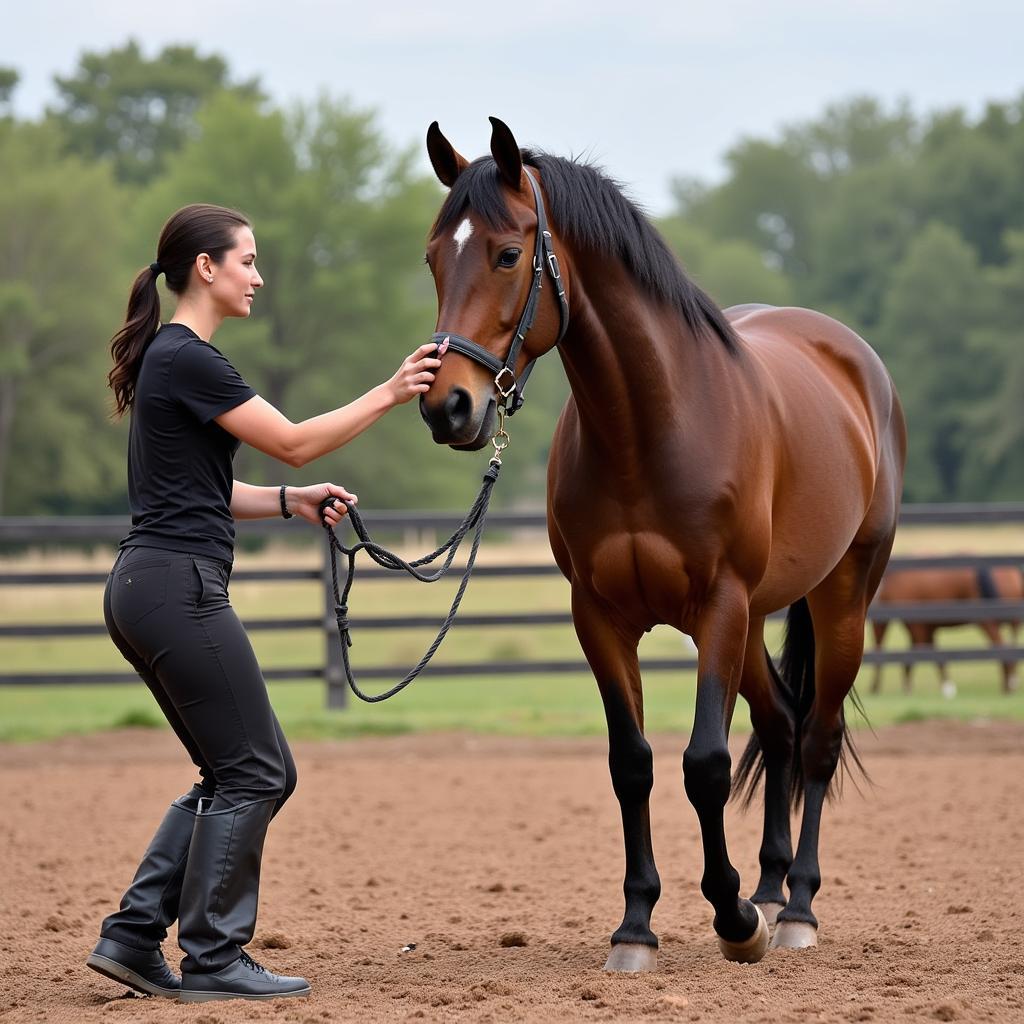A Nervous Horse can be a challenge for any rider, experienced or otherwise. This anxious behavior stems from a variety of factors, from their natural instincts as prey animals to past negative experiences. Recognizing the signs of a nervous horse, understanding the root causes, and employing proper handling techniques are essential for ensuring the well-being of these sensitive creatures.
Identifying a Nervous Horse: Signs and Signals
Nervousness in horses manifests in a variety of ways. It’s crucial to recognize these signs, as they often precede more pronounced anxious behaviors. Here are some common indicators of a nervous horse:
- Restlessness and Pacing: A nervous horse might constantly shift their weight, pace in their stall or paddock, or have difficulty standing still.
- Head Shying: Quickly pulling their head away from touch or perceived threats, even in non-aggressive situations.
- Elevated Vital Signs: Increased heart rate, rapid breathing, and dilated pupils are physical signs of stress in horses.
- Sweating: While sweating can be normal during exercise, excessive sweating when at rest or with minimal exertion can indicate anxiety.
- Spooking: Overreacting to sudden movements, sounds, or unfamiliar objects, often characterized by jumping or shying away.
 Nervous Horse Pacing
Nervous Horse Pacing
Common Causes of Nervousness in Horses
Understanding the underlying reasons for a horse’s nervousness is key to addressing the issue effectively. Some common causes include:
- Genetics and Temperament: Some horses are naturally more sensitive and reactive than others, a trait often influenced by breed and lineage.
- Lack of Early Handling: Horses that haven’t been consistently handled from a young age might be wary of humans and unfamiliar situations.
- Past Trauma: Negative experiences, such as harsh training methods, abuse, or accidents, can leave lasting emotional scars on a horse.
- Environmental Stressors: Loud noises, sudden changes in routine, unfamiliar surroundings, or isolation from other horses can trigger anxiety.
Calming the Nervous Horse: Effective Handling Techniques
Addressing a nervous horse requires patience, understanding, and a calm demeanor. Here are some techniques to help alleviate their anxiety:
- Establish Trust and Leadership: Be consistent, firm, and fair in your interactions. Horses respond well to clear communication and a confident leader.
- Desensitization and Counter-Conditioning: Gradually introduce the horse to potentially frightening stimuli in a controlled environment, pairing them with positive reinforcement.
- Groundwork Exercises: Engage in groundwork exercises that encourage focus and calmness, such as leading exercises, backing up, and lateral flexion.
- Appropriate Riding: When riding, maintain a balanced and relaxed seat. Avoid harsh aids or sudden movements that could startle the horse.
- Environmental Enrichment: Provide a stimulating and comfortable environment with access to companions, turnout time, and toys to alleviate boredom and stress.
 Horse Groundwork Training
Horse Groundwork Training
Seeking Professional Help
While many nervous horses benefit from patient handling and training, some cases might require professional intervention. If you’re struggling to manage your horse’s anxiety, consider consulting a qualified equine veterinarian or a certified horse behaviorist.
Don’t hesitate to explore our other resources on horse health and behavior, including articles on horse muscle relaxant, banana horse, and horse limping.
Conclusion: A Journey of Patience and Understanding
Working with a nervous horse can be a rewarding journey. By understanding the causes of their anxiety and employing compassionate handling techniques, you can help your horse overcome their fears and build a strong, trusting bond. Remember, patience, consistency, and empathy are key to unlocking the potential of these sensitive creatures.
FAQ
Q: Can any horse become nervous?
A: While some horses are genetically predisposed to nervousness, any horse can develop anxiety due to environmental stressors or negative experiences.
Q: What are some signs my horse might need professional help?
A: If your horse’s anxiety is severe, doesn’t improve with training, or poses a safety risk, it’s essential to consult a veterinarian or behaviorist.
Q: What is the best way to approach a nervous horse?
A: Approach calmly and confidently, avoiding sudden movements or loud noises. Speak softly and allow the horse to approach you first.
Need More Help?
For further assistance with your horse’s well-being, explore our other helpful articles like horse muscle relaxer and horse backpacking.
Still have questions about your nervous horse? Don’t hesitate to reach out! Contact us at Phone Number: 0772127271, Email: [email protected], or visit us at QGM2+WX2, Vị Trung, Vị Thuỷ, Hậu Giang, Vietnam. Our dedicated customer support team is available 24/7 to assist you.